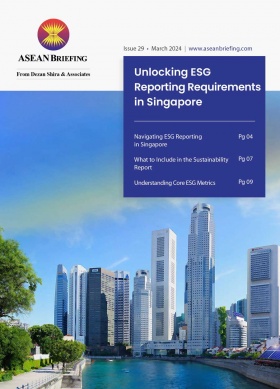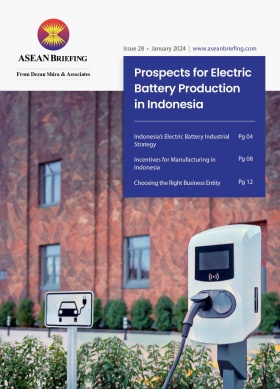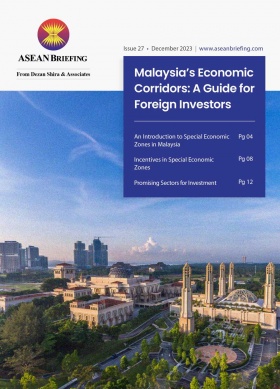Hanoi’s Push to Become Southeast Asia’s Semiconductor Hub
Hanoi, the capital of Vietnam, is taking measures to realize its ambition to become a hub for semiconductor production in Vietnam by 2050. This strategy is part of the country’s National Master Plan for 2021-2030 with a vision to 2050. Under the plan, Vietnam envisions becoming an upper-middle-income nation by 2030, propelled by developments and investments in science, innovation, technology, and digital transformation.
Vietnam as a potential hub for semiconductor production in Southeast Asia
The semiconductor industry is one of the most strategic sectors of the world economy. Global semiconductor sales reached over US$500 billion in 2022 and are projected to reach over US$1 trillion by 2030.
With the ongoing US-China trade tensions in addition to increasing global demand for chips, Vietnam has the potential to develop as a semiconductor manufacturing hub. The country is already among the top 10 in the world for the export of semiconductor devices and integrated circuits, with the industry expected to grow at an annual rate of six percent until 2027. Vietnam was also third, behind Malaysia and Taiwan in terms of semiconductor exports to the U.S. in 2023, reaching US$562 million, up from US$321 million in 2022.
Further, the country has already attracted an array of international semiconductor producers who have established operations in the country. These include Infineon Technologies AG, Amkor Technology Group, Samsung, Qualcomm, and Texas Instruments, among others.
As of 2023, Samsung had invested a total of US$22.4 billion into the country’s high-tech sector and Hana Micron Vina has committed to invest US$1 billion to boost Vietnam’s chip production by 2025. Nvidia, one of the largest semiconductor producers in the world, aims to set up a base in Vietnam with the company already having invested US$250 million in the Southeast Asian nation.
However, Vietnam’s contribution is relatively small when the entire supply chain is considered. The country primarily participates in the final stage of semiconductor production, focusing on assembly, testing, and packaging, and thus represents the lower value of the supply chain. The challenge for Vietnam is to elevate itself in the supply chain by developing its design and packaging capabilities to have greater influence in the global semiconductor industry.Hanoi’s advantage
Hanoi has many advantages that can propel itself in the semiconductor supply chain. The city is strategically located in the center of the Red River delta, an important axis for political, economic, and scientific activities in Vietnam. The city is also one of the leading localities for foreign investment. Hanoi attracted US$1.7 billion in FDI in 2022, ranking it among the top seven destinations for FDI inflow in Vietnam.
Moreover, Hanoi is striving to complete various infrastructure projects aimed at lowering business costs for investors. These include expressways, highways, provincial roads, radial roads, and belt road projects by 2030. Under the government’s infrastructure master plan, Vietnam will build thousands of kilometers of new expressways, high-speed rail routes, deepwater ports, and new international airports. The government hopes Vietnam can achieve a cargo transportation capacity of 4.4 billion tons per year, and a road transport capacity capable of moving 2.76 tons of cargo and 9.43 million passengers per year.
According to Vietnam’s Ministry of Justice, the city needs some US$192.5 billion to build a comprehensive mass transit network with its satellite cities.
Government support
In February 2024, Vietnam’s government announced plans to issue new tax breaks and other perks for semiconductor companies establishing operations in the country.
These perks will include industry grants, particularly for research and development activities. This will be vital in attracting foreign experts into the workforce as well as encouraging global semiconductor companies to engage in greater technology transfer deals.
Vietnam has a chronic shortage of engineers, which is emerging as a major obstacle to the growth of its semiconductor industry. This also represents a challenge for the U.S. for its plan to fast-track the Southeast Asian country as an alternative chip production base to hedge against China.
As such, Vietnam aims to train some 50,000 engineers by 2030 with the capacity to be deeply involved in the design process of modern semiconductor circuits.
The city of Hanoi is also prioritizing incentives that attract investments in high-tech, clean-tech, and environmentally friendly sectors. The city is developing 25 industrial zones, 10 of which are already in operation, to attract such investments. Currently, industrial enterprises in Hanoi can enjoy corporate income tax exemption for the first four years, a five percent rate for the following nine years, and a 10 percent rate for the following 15 years.
Further, Hanoi also exempts import duties on imported goods used for raw materials and components used in certain approved projects, as well as policies to reduce land lease and land use fees.
Conclusion
As Hanoi strives to become a leading hub for semiconductor production, it faces both opportunities and challenges on its path to success. Emerging trends in the global semiconductor industry, technological advancements, and geopolitical dynamics will shape the landscape for Hanoi’s semiconductor ecosystem in the years to come.
With Vietnam’s aim to increase its participation in the global semiconductor market, more proactive government support, particularly in upskilling the burgeoning talent pool in addition to targeted incentives can further attract investments in semiconductor production in Hanoi.
About Us
ASEAN Briefing is produced by Dezan Shira & Associates. The firm assists foreign investors throughout Asia and maintains offices throughout ASEAN, including in Singapore, Hanoi, Ho Chi Minh City, and Da Nang in Vietnam, in addition to Jakarta, in Indonesia. We also have partner firms in Malaysia, the Philippines, and Thailand as well as our practices in China and India. Please contact us at asean@dezshira.com or visit our website at www.dezshira.com.
- Previous Article Appointing a Data Protection Officer in Indonesia
- Next Article A Guide to Estimated Chargeable Income Filing in Singapore








